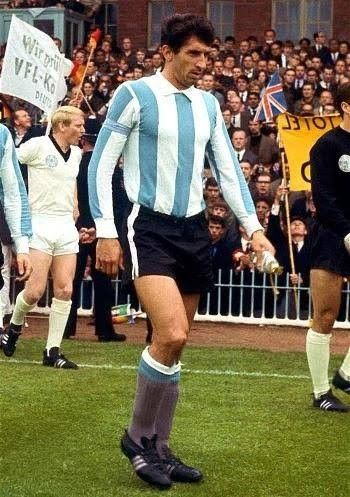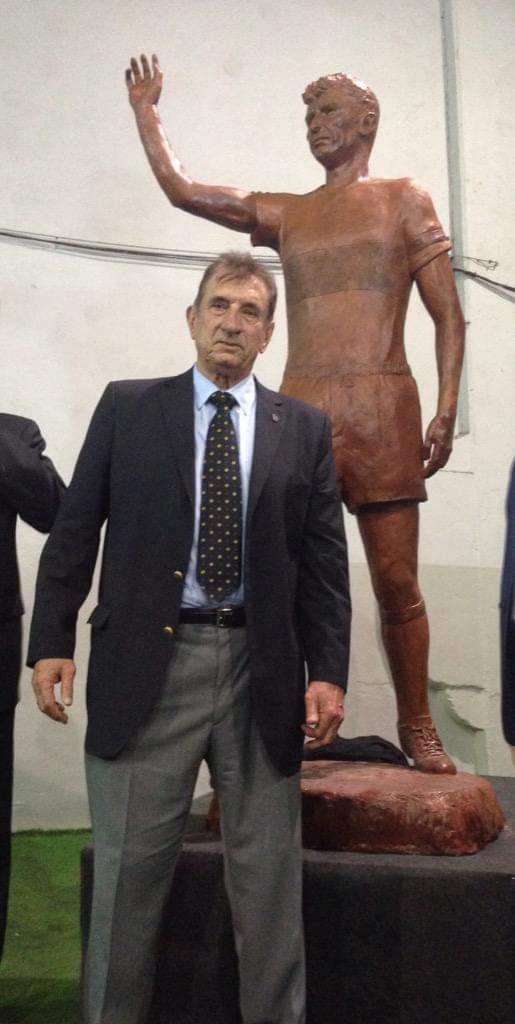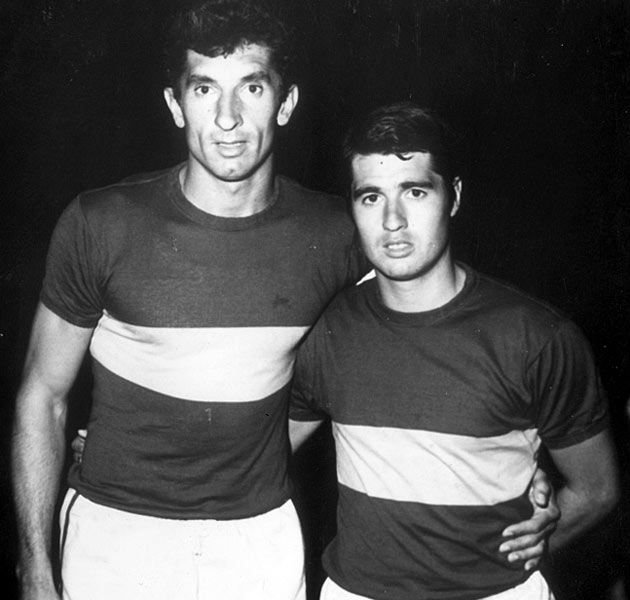Historias del fútbol de antes

Es indiscutible que todos los deportes evolucionan, no siempre para bien ya que el dinero comenzó lentamente a formar parte de la ecuación deportes-espectáculos-negocios y eso en general ha provocado una distorsión en la esencia de cada uno de ellos.
Como se dice habitualmente, antes se jugaba por la camiseta (o los colores) y ahora se juega por dinero y fama. Una perspectiva distinta que me hizo recordar a la famosísima frase "Un pequeño paso para el hombre, un gran salto para la humanidad" que mencionó el astronauta Neil Armstrong cuando en el año 1969 pisó la Luna por primera vez; fuera de todo apasionamiento, un pequeño cambio puede producir efectos impredecibles y algo así ha ocurrido con los deportes cuando el dinero ingresó de forma decidida a influir en los destinos de los deportistas y los deportes.
Justamente unos años antes de que Neil Armstrong pisara por primera vez la luna yo, o mejor dichos mis padres y yo como lógica consecuencia debido a que tenía apenas 7 años, nos mudábamos desde el pequeño pueblo de Ensenada, en la provincia de Buenos Aires a la Capital Federal, un gran cambio por supuesto, pasar de vivir en un lugar con unos pocos habitantes donde todos se conocían a otro con millones, pero donde no conocía a nadie. Sentí la enorme diferencia en varios aspectos entre ellos en mi incipiente pasión deportiva que era Gimnasia y Esgrima de La Plata, mi padre ya me había llevado en varias oportunidades al estadio y comprender que desde ese momento sería muy difícil volver a visitar aquella pequeña pero simpática y amigable cancha me provocó cierta angustia, aunque quizás sin proponérmelo también abrió mi mente a otros equipos, a otros deportes y a la selección nacional de fútbol.

Justamente el del año 1966 fue el primer mundial que me interesó, se jugó en Inglaterra y nuestra selección tenía un gran equipo por lo tanto había mucha ilusión por aquí, recuerdo a una de las figuras preponderantes, no tanto por su categoría de jugador que la tenía sin dudas sino más por su personalidad, un verdadero caudillo y capitán que con su coraje y entrega contagiaba a sus compañeros, me refiero a Antonio Ubaldo Rattín, jugaba de 5 y en aquella época el número que tenían en sus espaldas los jugadores indicaban su posición en el campo de juego, era volante central. Fue uno de los más carismáticos y queridos jugadores de Boca Juniors y como solía ocurrir en aquellos años, toda su vida deportiva la desarrolló en ese club. Algo impensado o fuera de lógica en la actualidad donde todos buscan las transferencias, si es posible al exterior donde se aseguran su futuro y el de varias generaciones si son cuidadosos.
Argentina venía de ganar invicta su zona en el torneo clasificatorio por Sudamérica y llegó al mundial, como dije antes, con grandes ilusiones. Le tocó lo que hoy se consideraría "el grupo de la muerte": Alemania, España y Suiza, por supuesto el formato de aquel torneo era completamente diferente a los actuales, solo 16 equipos divididos en 4 grupos de 4 equipos cada uno. Se le ganó a España y a Suiza y se empató cero a cero con Alemania quedando segundos de éste por diferencia de gol. Eso nos dejó justo en la peor llave, debíamos jugar con el anfitrión en cuartos de final.
Por supuesto los años transcurridos y la escasa cobertura periodística de aquellos años donde la TV no estaba ni por asomo desarrollada como ahora provocaba que los partidos solo pudieran escucharse por radio y con un sonido bastante malo, por cierto. El encuentro era muy parejo y según se dijo, el árbitro alemán era muy parcial en sus fallos a favor del local, Rattín como capitán y llevado por su gran personalidad fue a protestar y darle a entender lo que ocurría y el árbitro lo expulsó inmediatamente, Se llevaban jugados 35 minutos del primer tiempo. A poco de finalizar el encuentro la resistencia argentina falló y se perdió 1 a 0.
Según se dijo, pese a que el árbitro no hablaba español y Rattín no hablaba alemán, el encargado de impartir justicia entendió que lo estaba insultado y por eso tomó la decisión de expulsarlo. En aquella época todavía no existían las tarjetas amarillas ni rojas así que se considera una expulsión directa, sin los avisos previos que se acostumbraban a señalar en aquellos encuentros de antaño.

El capitán argentino en señal de disgusto y protesta salió del campo de juego y se sentó en una alfombra roja a pocos metros del estratégico lugar donde se encontraba la reina de Inglaterra observando las acciones. Una afrenta dijo luego la prensa inglesa.
En ese mundial, como en casi todos hubo grandes sorpresas y Brasil que venía de ser campeón en 1962 con la rutilante figura de Pelé, no pudo pasar de la primera ronda y su grupo fue ganado por un sorprendente Portugal que debutaba en mundiales y consagró al gran goleador Eusebio.
El campeón finalmente fue Inglaterra y por aquí se dijo que Alemania tuvo su justo castigo ya que el árbitro de esa final lo perjudicó casi tanto como el de esa nacionalidad que colaboró con sus fallos en la eliminación de Argentina unos días antes.
Rattín, el gran capitán de la selección nacional continuó jugando en el club de sus amores hasta su retiro, hoy en día tiene su estatua en el museo del club.
Old football stories
It is indisputable that all sports evolve, not always for the better, since money slowly began to form part of the sports-entertainment-business equation and this has generally caused a distortion in the essence of each one of them.
As is commonly said, before it was played for the shirt (or the colors) and now it is played for money and fame. A different perspective that reminded me of the famous phrase "One small step for man, one giant leap for humanity" mentioned by astronaut Neil Armstrong when he stepped on the Moon for the first time in 1969; Outside of all passion, a small change can produce unpredictable effects and something like that has happened with sports when money entered in a determined way to influence the destinies of athletes and sports.
Just a few years before Neil Armstrong set foot on the moon for the first time, I, or rather my parents and I as a logical consequence since I was barely 7 years old, moved from the small town of Ensenada, in the province of Buenos Aires to the Federal Capital, a great change of course, going from living in a place with a few inhabitants where everyone knew each other to another with millions, but where I knew no one. I felt the enormous difference in several aspects between them in my incipient sporting passion was Gimnasia y Esgrima de La Plata, my father had already taken me to the stadium on several occasions and I understood that from that moment on it would be very difficult to visit that small but nice one again. and friendly pitch caused me some anguish, although perhaps unintentionally it also opened my mind to other teams, other sports, and the national soccer team.
The year 1966 was precisely the first World Cup that interested me, it was played in England and our team had a great team, so there was a lot of enthusiasm around here, I remember one of the preponderant figures, not so much for his category of player than for his he had without a doubt but more because of his personality, a true leader and captain who with his courage and dedication infected his teammates, I mean Antonio Ubaldo Rattín, he played 5 and at that time the number that the players had on their backs indicated their position on the field of play, he was a central midfielder. He was one of the most charismatic and beloved players of Boca Juniors and as it used to happen in those years, he spent his entire sporting life at that club. Something unthinkable or out of logic at present when everyone seeks transfers, if possible, abroad where they ensure their future and that of several generations if they are careful.
Argentina had just won their zone undefeated in the qualifying tournament for South America and arrived at the World Cup, as I said before, with great hopes. It touched what today would be considered "the group of death": Germany, Spain, and Switzerland, of course, the format of that tournament was completely different from the current ones, only 16 teams divided into 4 groups of 4 teams each. They beat Spain and Switzerland and drew 0-0 with Germany, remaining second behind them on goal difference. That left us right in the worst key, we had to play the host in the quarterfinals.
Of course, the years that have passed and the scarce journalistic coverage of those years when the TV was not remotely developed as it is now meant that the matches could only be heard on the radio and with a rather bad sound, by the way. The match was very even and according to what was said, the German referee was very biased in his rulings in favor of the local team. Rattín, as captain and driven by his great personality, went to protest and make him understand what was happening and the referee sent him off immediately. 35 minutes of the first half had been played. Shortly after the match ended, the Argentine resistance failed and lost 1-0.
According to what was said, despite the fact that the referee did not speak Spanish and Rattín did not speak German, the person in charge of delivering justice understood that he was insulted and therefore made the decision to expel him. At that time there were no yellow or red cards yet, so it is considered a direct expulsion, without the previous warnings that were used to point out in those matches of yesteryear.
The Argentine captain, as a sign of disgust and protest, left the playing field and sat on a red carpet a few meters from the strategic place where the Queen of England was observing the actions. An affront then said the English press.
In that World Cup, as in almost all of them, there were big surprises and Brazil, which had just been champion in 1962 with the brilliant figure of Pelé, could not get past the first round and their group was won by a surprising Portugal that was debuting in the World Cup and consecrated the great scorer, Eusebio.
The champion was finally England and here it was said that Germany had its just punishment since the referee of that final harmed it almost as much as that nationality that collaborated with its failures in the elimination of Argentina a few days before.
Rattín, the great captain of the national team, continued to play in the club of his love until his retirement, today he has a statue of him in the club's museum.
Héctor Gugliermo
@hosgug
Créame que cada vez que usted sube un post y más si se trata de jugadores emblemáticos del deporte Argentino, me quedo a disfrutar y aprender de su contagiante narración.
Muchas gracias Héctor.
Saludos.
Gracias a ti por leer mis publicaciones y por los elogios, no creo ser merecedor de tales halagos.
Un cordial saludo @palabras1 y sigamos adelante con esta gran comunidad que atrae a tantos apasionados de los deportes.
Excelente post mi amigo, realmente hay cosas que no conocía sobre el Mundial de 1966 por más que he buscado información al respecto, a pesar de ser cubano comparto la afición por la Argentina y el fútbol inglés casualmente y sinceramente al leer esto me doy cuenta cuánta pasión corre por las venas del aficionado albiceleste
Gracias por tus comentarios @sadiel0102. Somos un pueblo apasionado en general y el fútbol canaliza mucho de esa característica, esa pasión también es como un escape a las difíciles situaciones que recurrentemente nos afectan.
Supongo que en Cuba también estarán acostumbrados a varios y repetidos problemas, aunque el deporte preferido sea otro.
Hablando de ello, en el baseball tienen grandísimos peloteros!
https://leofinance.io/threads/view/fulldeportes1/re-leothreads-2hdtsms3b
Que buen relato, me encanta conocer estos datos que hoy día sino se buscan directamente poco se conoce de ellos, que anécdota la de que el capitán se sentase tan cerca de la reina un desparpajo tan latino y bien hecho para con esos caraduras ingleses amañosos jeje, poco a poco el fútbol va siguiendo el camino del dinero, como que estamos viendo el éxodo de las estrellas en decadencia a la liga árabe cosa que se podía prever tras el mundial, es esa evolución del deporte ajustándose a los tiempos ayer y ahora, un saludo!